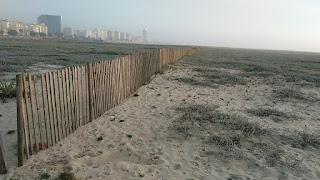Solução Letal: Biocombustíveis

No princípio a solução parecia boa: substituir combustíveis derivados do petróleo (gasolina e gasóleo) pelos naturais biocombustíveis. Uma prática corrente desde há décadas no Brasil, onde os restos da cana de açúcar são transformados em combustível.
Outra ideia em marcha, apelativa e eficaz, é a transformação dos resíduos de óleos alimentares em biodiesel. Há dezenas de empresas a trabalhar neste nicho de mercado.
Com a subida em flecha do preço do petróleo, as grandes empresas procuram obter quantidades substanciais de biocombustíveis (raps, óleo de palma, cereais...). Os preços subiram, a procura não pára de aumentar, e a devastação de vastas áreas de floresta virgem (Malásia, Indonésia...) em busca do óleo de palma são mais uma ameaça. Vários grupos ambientalistas avisam, e particularmente o célebre ambientalista George Monbiot, escrevia o seguinte , há mais de um ano atrás:
A Lethal Solution
Posted March 27, 2007
We need a five-year freeze on biofuels, before they wreck the planet.By George Monbiot. Published in the Guardian 27th March 2007.
It used to be a matter of good intentions gone awry. Now it is plain fraud. The governments using biofuel to tackle global warming know that it causes more harm than good. But they plough on regardless.
In theory, fuels made from plants can reduce the amount of carbon dioxide emitted by cars and trucks. Plants absorb carbon as they grow - it is released again when the fuel is burnt. By encouraging oil companies to switch from fossil plants to living ones, governments on both sides of the Atlantic claim to be “decarbonising” our transport networks.
So what’s wrong with these programmes? Only that they are a formula for environmental and humanitarian disaster. In 2004 this column warned that biofuels would set up a competition for food between cars and people. The people would necessarily lose: those who can afford to drive are, by definition, richer than those who are in danger of starvation. It would also lead to the destruction of rainforests and other important habitats(5). I received more abuse than I’ve had for any other column, except when I attacked the 9/11 conspiracists. I was told my claims were ridiculous, laughable, impossible. Well in one respect I was wrong. I thought these effects wouldn’t materialise for many years. They are happening already.
Since the beginning of last year, the price of maize has doubled(6). The price of wheat has also reached a 10-year high, while global stockpiles of both grains have reached 25-year lows(7). Already there have been food riots in Mexico and reports that the poor are feeling the strain all over the world. The US department of agriculture warns that “if we have a drought or a very poor harvest, we could see the sort of volatility we saw in the 1970s, and if it does not happen this year, we are also forecasting lower stockpiles next year.”(8) According to the UN Food and Agriculture Organisation, the main reason is the demand for ethanol: the alcohol used for motor fuel, which can be made from both maize and wheat(9).
http://www.monbiot.com/archives/2007/03/27/a-lethal-solution/
Propõem-se soluções mais equilibradas, menos consumo, menos transporte individual, menos ganância pelo controlo dos recursos do mundo. Há quem não aceite, e culpa os ambientalistas pela subida do preço dos cereais... e também há quem culpe o Greenpeace e a Quercus pela miséria no mundo.
Muitos dos cronistas "anti-ambiente" são portadores de um preconceito fortíssimo, incapazes de pesquisar e investigar, e de distinguir o verdadeiro do falso.



O que é que o preço do arroz tem a ver com biocombustíveis?
ResponderEliminarFaz-se biocombustível de arroz?
Antes de se falar de biocombustíveis não havia fome no mundo?
Só agora é que há fome e a culpa é dos biocombustíveis?
A Mobil, a Shell, a BP, a Exxon têm muitos recursos para influenciar a opinião publica, não acha?
Ainda não é chegado o ponto e o tempo em que o prato da balança se incline para o lado dos cereais roubados à boca dos famintos de ontem e de hoje.